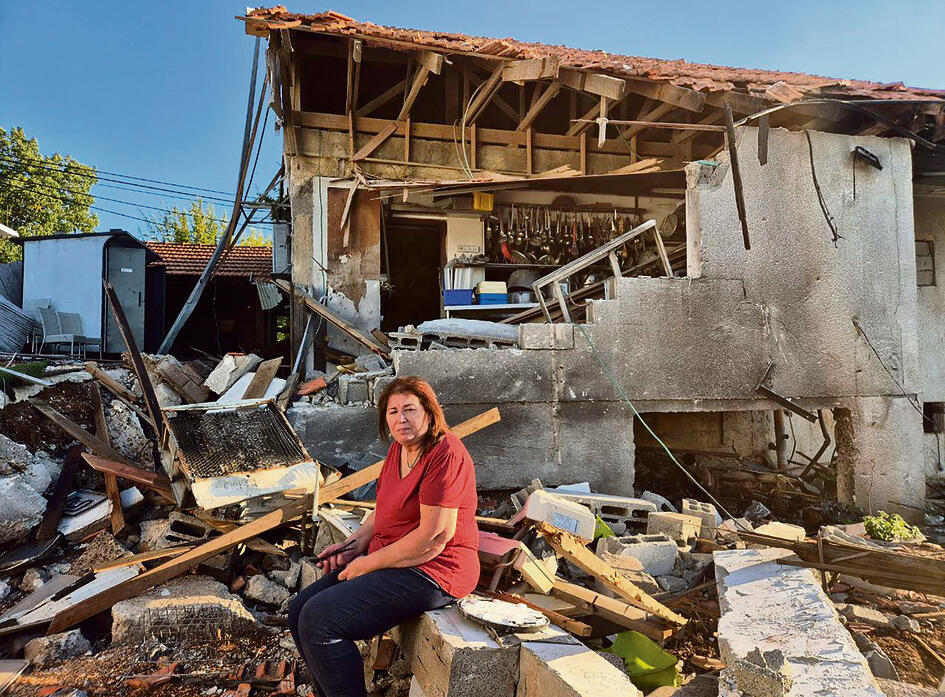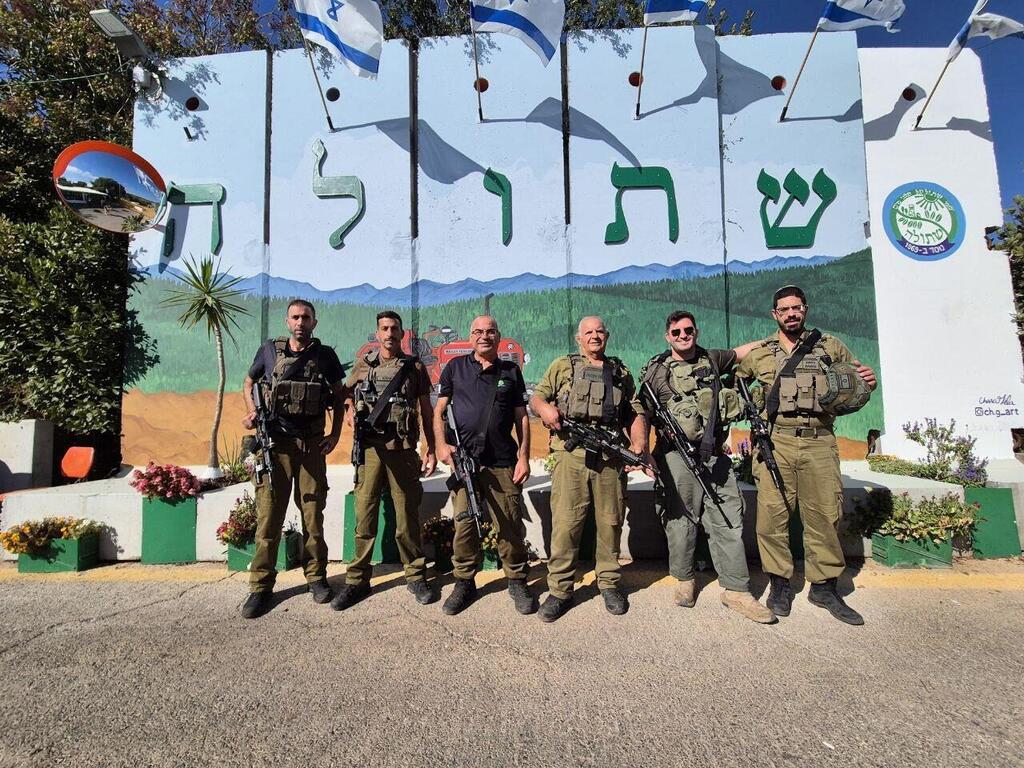Getting your Trinity Audio player ready...
Direct hit on Shtula
The blaring siren didn’t distract Ora Hatan from her cooking duties, nor did the explosion that followed moments later. After all, she was responsible for feeding 250 soldiers for the holiday, plus a journalist who arrived to a table laden with chicken and rice, grilled eggplant and homemade pickles. Having stayed in the moshav of Shtula in the Western Galilee, right on the Lebanese border, since the onset of the war, she had grown accustomed to it all.
Her young son Yair, soon to celebrate his 11th birthday, has also gotten used to the sirens and explosions. When the blast echoed, he dashed to the balcony to watch the smoke rising from the impact site. When I asked Ora if she feared for his safety, she replied, "Let’s ask him. Yair, are you scared?" To which he said, "I’m only afraid of the jackals."
"Two months ago, a rabid jackal bit him. We rushed to the hospital for a vaccine. Luckily, we weren’t here then, because the neighboring house was hit by an anti-tank missile that day. All my windows shattered, and the outer wall was pocked with shrapnel. By the way, I’m sure Hezbollah knows me by now. There’s probably some guy in the village with binoculars saying, 'There goes that crazy lady again.'"
When she tells the story of her mother, Sarah Hatan, who lit a torch at the Independence Day state ceremony and at age 70 traveled alone on a journey to Kurdish Iraq, hitchhiking and taking taxis, you begin to understand where Ora inherited her courage. Ora and her sister eventually found their mother, sipping tea in a hotel lobby on the Turkish border. "If my mother were alive, she’d say, 'I didn’t come from Kurdistan 80 years ago just to leave our home and become refugees again.'"
Ora, one of 14 siblings, is a single mother, a home-based business owner, and a law student. She took me to see the family restaurant, destroyed by a rocket strike. Fifteen minutes after we left, two mortar shells landed where we had been standing.
Shtula is a small farming community of about 300 residents, nearly all of whom have evacuated. It alert squad members have been on call for a year. Those off-duty were enjoying a cup of Kurdish black tea with cinnamon. They heard the news of Nasrallah's elimination through their radio. Orly Hajbi, their operations coordinator, reported that his body was found intact in the rubble. Someone quipped, "He’s lightly dead."
"Since the IDF took off the gloves, people here have started to smile," says Eliyahu Galil, a member of the small town's alert squad member, just before the ground incursion began that night. "Until now, we played ping-pong with them. We’ve moved to chess. And now they’ve lost their king. When we got the message, we danced and sang Sabbath songs. We even allowed ourselves a little beer."
Eliyahu, 42, married with five children, has a personal vendetta against Nasrallah. His house, located at the edge of the moshav just yards from the border, was hit by two anti-tank missiles. "When the first missile was fired, I had just come home to pick up some things," he recalls. "It sounded like a truck barreling toward you. I had a few seconds to reach the shelter and close the door. The missile went through the living room and kitchen."
In his case, it ended with property damage. His friend in the emergency squad, Lior Hatan, lost his cousin, Eyal Uzan, who was killed in early December by an anti-tank missile while checking his peach and apple orchards near Moshav Netu’a. Lior owns a guest villa that has been abandoned since the war began. "I have clients who used to come every year, and now they write to me: 'We’re on vacation abroad; bring your family and come to us. Our home is your home.'"
Noam Elimelech, a 28-year-old medic from Kfar Yona, has been attached to the emergency squad since July. Before that, he fought in Gaza. "We started in the northern Gaza Strip, then moved to the central camps and Khan Younis. In my first hour in Gaza, I treated a badly wounded soldier from an explosion on our force. We were supposed to start a rotation in Rafah, and I said: enough is enough. I came here to gather some strength for the next round. I’m already due at the Nitzanim Corridor."
Israel Levi, 68, is the oldest member of the emergency squad. "We came here in '69 from the Lachish region. My mother is from the Hatan family. She’s in her 80s, married at 14. Now she’s evacuated to Nof HaGalil."
Carrot or stick
Shlomi Hatan, 55, has been the security officer of Shtula for 20 years. "This is one of the most threatened communities in the area because of the topography and the hostile village opposite us," he explains.
"There are terror squads that pop up, shoot and flee. Our demand is simple: move them from the frontline opposite Shtula. By brains or by force, it must be done, even if it means establishing a security zone on the other side. Only this way can we bring back the residents, especially families with children."
Ora, whose home is located next to the site of the 2006 kidnapping of IDF soldiers by Hezbollah that led to the Second Lebanon War, fears a repeat. "We mustn't enter Lebanon," she says, "Absolutely not. My heart is with the soldiers' mothers and their wives and children. Nasrallah and his cronies have set up many traps. At the end of the day, there will be a settlement. So what's the point? It's a shame for every soldier killed. We need to reach an agreement, but one that will be enforced. Not by the UN or other forces. Until then, we must continue bombing them from the air, and the IDF is doing it beautifully, leaving no trace of their leadership."
Ahead of Rosh Hashanah, Ora went to clean the abandoned synagogue. "It should be clean, even if there are no worshipers. I prayed: 'God, let the hostages return to their families.' I don't care about anything else. Let them come home first."
This was the only time during the interview that this fearless woman teared up.
Get the Ynetnews app on your smartphone:







